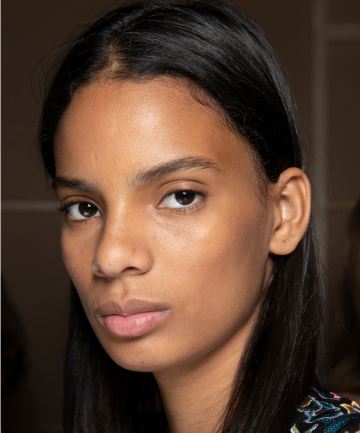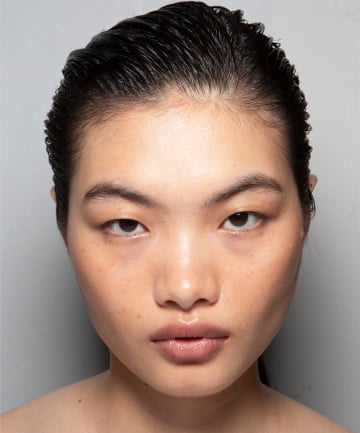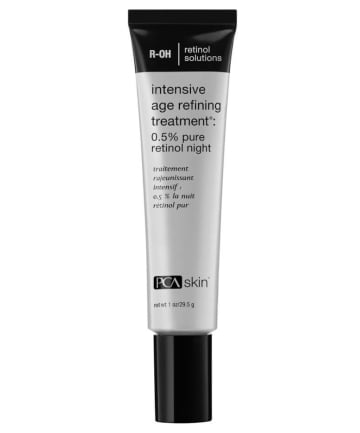Encapsulated retinol products generally keep light and oxygen away from the active ingredients until the formula is applied to skin which means it's more stable. (Think of the submarines.) Prystowsky says that this will help ensure potency of the product until each dose is used. That means users will get more consistent dosages, which is important in skin care, especially when using powerful ingredients. Gohara continues that encapsulated retinol will be able to penetrate deeper into skin since it is protected by an outer layer (the capsule) until it hits its destination. Then it can get to work fading wrinkles, preventing acne and boosting collagen production.
Image via Imaxtree
Image via Imaxtree
Encapsulation seems like a star method, but Akridge says that there are potential problems. He says that heat and light are still threats. (So, look for retinol products in dark bottles and/or tinted capsules. Prystowsky says do not store products near sunlight or radiators.)
Additionally, In some cases the capsule may be many times bigger than the retinol dosage so other nonactive ingredients could be added to the formula to "bulk it out." Akridge says that some of these ingredients could bind to retinol, rendering it less effective.
Another thing to consider? The potential break down of encapsulated retinol. It depends on the encapsulation method used; heat, time and production. Akridge says that some liposomes are fragile, so they are added in the last step of production. "If they survive production, and make it into the bottle intact, they sit there in a chemical mixture waiting for purchase, hoping they won't be exposed to heat or light," says Akridge. "The question I have is if the remaining liposome-encapsulated retinol makes it to your skin, is this concentration effective enough to do anything?"
If the encapsulation works, the encapsulated retinol should last longer than "regular" retinol, but it still doesn't last forever.
Image via Imaxtree
Additionally, In some cases the capsule may be many times bigger than the retinol dosage so other nonactive ingredients could be added to the formula to "bulk it out." Akridge says that some of these ingredients could bind to retinol, rendering it less effective.
Another thing to consider? The potential break down of encapsulated retinol. It depends on the encapsulation method used; heat, time and production. Akridge says that some liposomes are fragile, so they are added in the last step of production. "If they survive production, and make it into the bottle intact, they sit there in a chemical mixture waiting for purchase, hoping they won't be exposed to heat or light," says Akridge. "The question I have is if the remaining liposome-encapsulated retinol makes it to your skin, is this concentration effective enough to do anything?"
If the encapsulation works, the encapsulated retinol should last longer than "regular" retinol, but it still doesn't last forever.
Image via Imaxtree
At Glow Recipe, Chang and Lee have opted for tinted jars that have been coated to protect the retinol formulas from UV rays. They also always recommend storing actives in a cool, dry location away from direct sunlight.
Don't stockpile retinol because of how readily it degrades. Prystowsky suggests only buying what you need for a month at a time. Be sure to look at the "best use by" date on bottles.
Image via Imaxtree
Don't stockpile retinol because of how readily it degrades. Prystowsky suggests only buying what you need for a month at a time. Be sure to look at the "best use by" date on bottles.
Image via Imaxtree
Some skin care brands report that encapsulated retinol is better for sensitive skin. Gohara says that encapsulated retinol is less likely to cause irritation because its delivery into skin is controlled. It should not irritate surrounding structures and it should target the components it is meant to stimulate. This makes it a good choice for retinol newbies. She like PCA Skin Intensive Age Refining Treatment 0.5% Pure Retinol Night, $110. It has OmniSome technology which encapsulates volatile ingredients in layers like an onion. The layers gradually break apart as the product enters skin which results in a time-released formula with the intention of less irritation.
However, Prystowsky says to still be cautious. "Encapsulation ensures an active product that is good for people with sensitive skin," she says. "But, even retinol can be overused and cause irritation. So, everyone needs to assess optimal frequency of use for their skin type." If you're unsure, consult your dermatologist.
Image via Imaxtree
However, Prystowsky says to still be cautious. "Encapsulation ensures an active product that is good for people with sensitive skin," she says. "But, even retinol can be overused and cause irritation. So, everyone needs to assess optimal frequency of use for their skin type." If you're unsure, consult your dermatologist.
Image via Imaxtree








